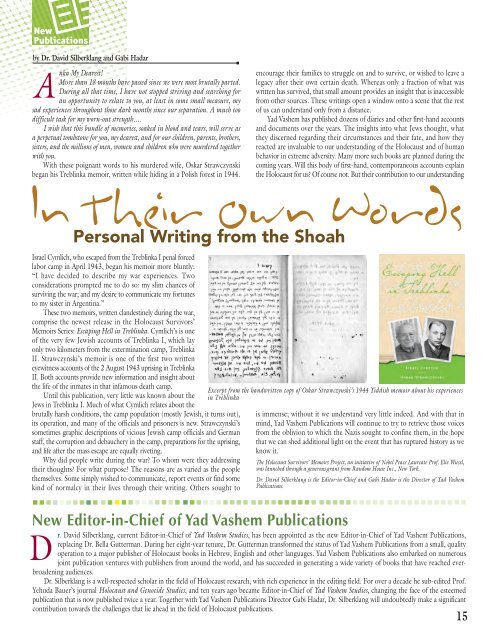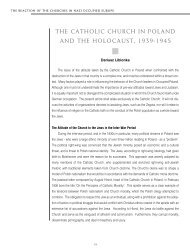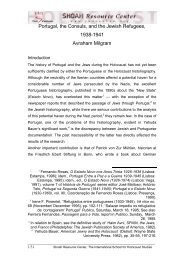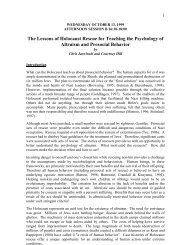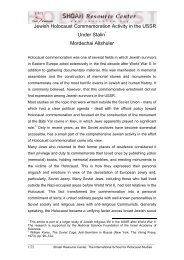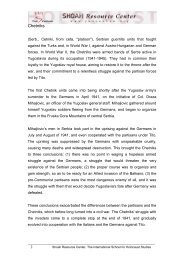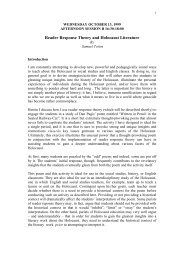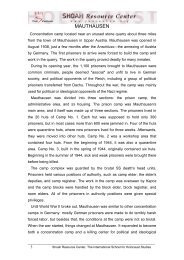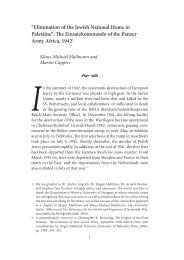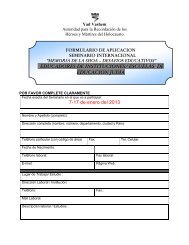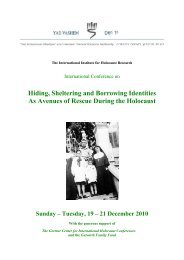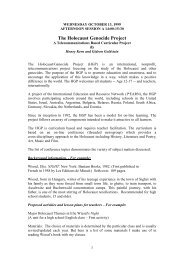Magazine 48 - Winter 2008 - Yad Vashem
Magazine 48 - Winter 2008 - Yad Vashem
Magazine 48 - Winter 2008 - Yad Vashem
Create successful ePaper yourself
Turn your PDF publications into a flip-book with our unique Google optimized e-Paper software.
New<br />
Publications<br />
by Dr. David Silberklang and Gabi Hadar<br />
A<br />
nka My Dearest!<br />
More than 18 months have passed since we were most brutally parted.<br />
During all that time, I have not stopped striving and searching for<br />
an opportunity to relate to you, at least in some small measure, my<br />
sad experiences throughout those dark months since our separation. A much too<br />
difficult task for my worn-out strength….<br />
I wish that this bundle of memories, soaked in blood and tears, will serve as<br />
a perpetual tombstone for you, my dearest, and for our children, parents, brothers,<br />
sisters, and the millions of men, women and children who were murdered together<br />
with you.<br />
With these poignant words to his murdered wife, Oskar Strawczynski<br />
began his Treblinka memoir, written while hiding in a Polish forest in 1944.<br />
Israel Cymlich, who escaped from the Treblinka I penal forced<br />
labor camp in April 1943, began his memoir more bluntly:<br />
“I have decided to describe my war experiences. Two<br />
considerations prompted me to do so: my slim chances of<br />
surviving the war; and my desire to communicate my fortunes<br />
to my sister in Argentina.”<br />
These two memoirs, written clandestinely during the war,<br />
comprise the newest release in the Holocaust Survivors’<br />
Memoirs Series: Escaping Hell in Treblinka. Cymlich’s is one<br />
of the very few Jewish accounts of Treblinka I, which lay<br />
only two kilometers from the extermination camp, Treblinka<br />
II. Strawczynski’s memoir is one of the first two written<br />
eyewitness accounts of the 2 August 1943 uprising in Treblinka<br />
II. Both accounts provide new information and insight about<br />
the life of the inmates in that infamous death camp.<br />
Until this publication, very little was known about the<br />
Jews in Treblinka I. Much of what Cymlich relates about the<br />
brutally harsh conditions, the camp population (mostly Jewish, it turns out),<br />
its operation, and many of the officials and prisoners is new. Strawczynski’s<br />
sometimes graphic descriptions of vicious Jewish camp officials and German<br />
staff, the corruption and debauchery in the camp, preparations for the uprising,<br />
and life after the mass escape are equally riveting.<br />
Why did people write during the war? To whom were they addressing<br />
their thoughts? For what purpose? The reasons are as varied as the people<br />
themselves. Some simply wished to communicate, report events or find some<br />
kind of normalcy in their lives through their writing. Others sought to<br />
encourage their families to struggle on and to survive, or wished to leave a<br />
legacy after their own certain death. Whereas only a fraction of what was<br />
written has survived, that small amount provides an insight that is inaccessible<br />
from other sources. These writings open a window onto a scene that the rest<br />
of us can understand only from a distance.<br />
<strong>Yad</strong> <strong>Vashem</strong> has published dozens of diaries and other first-hand accounts<br />
and documents over the years. The insights into what Jews thought, what<br />
they discerned regarding their circumstances and their fate, and how they<br />
reacted are invaluable to our understanding of the Holocaust and of human<br />
behavior in extreme adversity. Many more such books are planned during the<br />
coming years. Will this body of first-hand, contemporaneous accounts explain<br />
the Holocaust for us? Of course not. But their contribution to our understanding<br />
In Their Own Words<br />
Personal Writing from the Shoah<br />
New Editor-in-Chief of <strong>Yad</strong> <strong>Vashem</strong> Publications<br />
D<br />
is immense; without it we understand very little indeed. And with that in<br />
mind, <strong>Yad</strong> <strong>Vashem</strong> Publications will continue to try to retrieve those voices<br />
from the oblivion to which the Nazis sought to confine them, in the hope<br />
that we can shed additional light on the event that has ruptured history as we<br />
know it.<br />
The Holocaust Survivors’ Memoirs Project, an initiative of Nobel Peace Laureate Prof. Elie Wiesel,<br />
was launched through a generous grant from Random House Inc., New York.<br />
Dr. David Silberklang is the Editor-in-Chief and Gabi Hadar is the Director of <strong>Yad</strong> <strong>Vashem</strong><br />
Publications.<br />
r. David Silberklang, current Editor-in-Chief of <strong>Yad</strong> <strong>Vashem</strong> Studies, has been appointed as the new Editor-in-Chief of <strong>Yad</strong> <strong>Vashem</strong> Publications,<br />
replacing Dr. Bella Gutterman. During her eight-year tenure, Dr. Gutterman transformed the status of <strong>Yad</strong> <strong>Vashem</strong> Publications from a small, quality<br />
operation to a major publisher of Holocaust books in Hebrew, English and other languages. <strong>Yad</strong> <strong>Vashem</strong> Publications also embarked on numerous<br />
joint publication ventures with publishers from around the world, and has succeeded in generating a wide variety of books that have reached everbroadening<br />
audiences.<br />
Dr. Silberklang is a well-respected scholar in the field of Holocaust research, with rich experience in the editing field. For over a decade he sub-edited Prof.<br />
Yehuda Bauer’s journal Holocaust and Genocide Studies, and ten years ago became Editor-in-Chief of <strong>Yad</strong> <strong>Vashem</strong> Studies, changing the face of the esteemed<br />
publication that is now published twice a year. Together with <strong>Yad</strong> <strong>Vashem</strong> Publications Director Gabi Hadar, Dr. Silberklang will undoubtedly make a significant<br />
contribution towards the challenges that lie ahead in the field of Holocaust publications.<br />
Excerpt from the handwritten copy of Oskar Strawczynski’s 1944 Yiddish memoir about his experiences<br />
in Treblinka<br />
15


